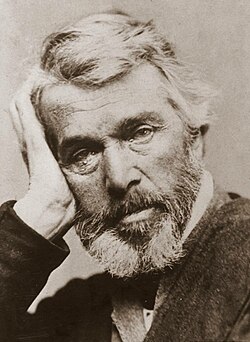Thomas Carlyle
 Thomas Carlyle (4 December 17955 February 1881) was a Scottish essayist, historian, and philosopher. Known as the "sage of Chelsea", his writings strongly influenced the intellectual and artistic culture of the Victorian era.
Thomas Carlyle (4 December 17955 February 1881) was a Scottish essayist, historian, and philosopher. Known as the "sage of Chelsea", his writings strongly influenced the intellectual and artistic culture of the Victorian era.Carlyle was born in Ecclefechan, a village in Dumfriesshire. He attended the University of Edinburgh where he excelled in mathematics and invented the Carlyle circle. After finishing the arts course, he prepared to become a minister in the Burgher Church while working as a schoolmaster. He quit these and several other endeavours before settling on literature, writing for the ''Edinburgh Encyclopædia'' and working as a translator. He initially gained prominence in English-language literary circles for his extensive writing on German Romantic literature and philosophy. These themes were explored in his first major work, a semi-autobiographical philosophical novel entitled ''Sartor Resartus'' (1833–34).
Carlyle eventually relocated to London, where he published ''The French Revolution: A History'' (1837). Its popular success made him a celebrity, prompting the collection and reissue of his earlier essays under the title of ''Miscellanies''. His subsequent works were highly regarded throughout Europe and North America, including ''On Heroes'' (1841), ''Past and Present'' (1843), ''Cromwell's Letters'' (1845), ''Latter-Day Pamphlets'' (1850), and ''Frederick the Great'' (1858–65). He founded the London Library, helped establish the National Portrait Galleries in London and in Edinburgh, became Lord Rector of the University of Edinburgh in 1865, and received the ''Pour le Mérite'' in 1874 among other honours.
Carlyle occupied a central position in Victorian culture, being considered the "undoubted head of English letters" and a "secular prophet". Posthumously, a series of publications by his friend James Anthony Froude damaged Carlyle's reputation, provoking controversy about his personal life and his marriage to Jane Welsh Carlyle in particular. His reputation further declined in the aftermaths of World War I and World War II, when his philosophy was seen as a precursor of both Prussianism and fascism. Growing scholarship in the field of Carlyle studies since the 1950s has improved his standing, and though little-read today, he is yet recognised as "one of the enduring monuments of [English] literature". Provided by Wikipedia
Showing 1 - 20 results of 755 for search 'Carlyle, Thomas', query time: 0.01s
Refine Results
-
1
Friedrich der Grosse by Carlyle, Thomas
Published 1910Call Number: Loading…
Located: Loading…Book Loading… -
2
<<Les>> héros Le culte des héros et l'héroǐque dans l'histoire by Carlyle, Thomas
Published 1888Call Number: Loading…
Located: Loading…Book Loading… -
3
<<The>> french Revolution by Carlyle, Thomas
Published 1934Call Number: Loading…
Located: Loading…Book Loading… -
4
On Heroes, hero-worship and the heroic in history by Carlyle, Thomas
Published 1935Call Number: Loading…
Located: Loading…Book Loading… -
5
Critical and miscellaneous assays : collected and republ. collected and republ. / by Carlyle, Thomas
Call Number: Loading…
Located: Loading…Book Loading… -
6
The French revolution : a history. by Carlyle, Thomas
Published 1888Call Number: Loading…
Located: Loading…Book Loading… -
7
The French revolution : a history. by Carlyle, Thomas
Published 1888Call Number: Loading…
Located: Loading…Book Loading… -
8
The French revolution : a history. by Carlyle, Thomas
Published 1888Call Number: Loading…
Located: Loading…Book Loading… -
9
The life of John Sterling The life of John Sterling / by Carlyle, Thomas
Published 1907Call Number: Loading…
Located: Loading…Book Loading… -
10
On heroes, hero-worship and heroic in history On heroes, hero-worship and heroic in history / by Carlyle, Thomas
Call Number: Loading…
Located: Loading…Book Loading… -
11
Arbeiten und nicht verzweifeln Arbeiten und nicht verzweifeln / by Carlyle, Thomas
Published 1915Call Number: Loading…
Located: Loading…Book Loading… -
12
Blicke eines Engländers in die kirchlichen und socialen Zustände Deutschland Blicke eines Engländers in die kirchlichen und socialen Zustände Deutschland / by Carlyle, Thomas
Published 1870Call Number: Loading…
Located: Loading…Book Loading… -
13
Die französische Revolution. by Carlyle, Thomas
Published 1900Call Number: Loading…
Located: Loading…Book Loading… -
14
Die französische Revolution. by Carlyle, Thomas
Published 1900Call Number: Loading…
Located: Loading…Book Loading… -
15
Die grosse Revolution Die grosse Revolution / by Carlyle, Thomas
Published 1911Call Number: Loading…
Located: Loading…Book Loading… -
16
Ueber Helden, Heldenverehnung und Heldentümliche in der Geschichte Ueber Helden, Heldenverehnung und Heldentümliche in der Geschichte / by Carlyle, Thomas
Published 1900Call Number: Loading…
Located: Loading…Book Loading… -
17
Über Helden, Heldenverehrung und das Heldentümliche in der Geschichte Über Helden, Heldenverehrung und das Heldentümliche in der Geschichte / by Carlyle, Thomas
Published 1917Call Number: Loading…
Located: Loading…Book Loading… -
18
Heldentum und Macht : Schriften für die Gegenwart by Carlyle, Thomas
Published 1940Call Number: Loading…
Located: Loading…Book Loading… -
19
Friedrich der Große by Carlyle, Thomas
Published 1929Call Number: Loading…
Located: Loading…Book Loading… -
20
Friedrich der Große by Carlyle, Thomas
Published 1912Call Number: Loading…
Located: Loading…Book Loading…
Search Tools:
Related Subjects
Biografie
Held
Heldenverehrung
Heroisierung
Heroismus
Historische Persönlichkeit
dějiny
Geschichte
Heroes
History
Schlacht bei Leuthen
Schlacht bei Roßbach
Schlacht bei Zorndorf
francouzská revoluce (1789-1794 : Francie)
Criticism and interpretation
German literature
History and criticism
kult osobnosti
sociální problémy
Authors, German
Franska revolutionen 1789-1799
Französische Revolution
Frédéric II (roi de Prusse ; 1712-1786)
Führung
Heros
Homes and haunts
Héros
Héros - Culte
Leadership
Literature
